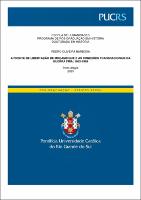| Share record |


|
Please use this identifier to cite or link to this item:
https://tede2.pucrs.br/tede2/handle/tede/10780| Document type: | Tese |
| Title: | A frente de libertação de Moçambique e as conexões transnacionais da Guerra Fria : 1962-1969 |
| Author: | Barbosa, Pedro Oliveira  |
| Advisor: | Paredes, Marçal de Menezes |
| Abstract (native): | A Frente de Libertação de Moçambique (FRELIMO) se movimentou de maneira ímpar pelo contexto internacional da Guerra Fria. Criada em 1962, ela reuniu desde sua formação moçambicanos de origens diversas, com diferentes projetos, ambições, e acesso a conexões transnacionais muito variadas. A unificação de agentes tão divergentes só foi possível após um choque entre suas perspectivas, o que envolveu uma rivalidade continental entre os projetos políticos da Tanganica e de Gana, que apadrinhavam esses moçambicanos em conflito. Finalmente estabelecida em Dar es Salaam em junho de 1962, a Frente passou a se projetar ao mundo. Entre 1962 e 1969 ela conseguiu o feito de tornar-se o único movimento anticolonial africano a receber apoio das três superpotências internacionais do período. Isso só foi possível a partir de caminhos tortuosos. Nos Estados Unidos, o presidente da FRELIMO, Eduardo Mondlane, recorreu a conexões antigas que possuía para conseguir suporte ao seu projeto humanitário, que se converteu na criação do Instituto Moçambique em 1963. Na União Soviética, Marcelino dos Santos, secretário das relações exteriores da FRELIMO, foi um importante porta-voz do movimento anticolonial moçambicano, que passou a receber um substancial apoio em armas vindo do leste europeu. Já na China, o vice-presidente Uria Simango se tornou um indivíduo respeitado nesse país asiático que logo enviou instrutores aos campos militares da FRELIMO, se tornando muito influente entre seus militantes. A Frente não passou impune por caminhos tão divergentes. Ao firmar bases sólidas para seu reconhecimento internacional, ela viu uma explosão de seus conflitos internos que quase levou à sua próprias extinção em 1969. |
| Abstract (english): | The Front for the Liberation of Mozambique (FRELIMO) moved in a unique way through the international context of the Cold War. Created in 1962, it brought together Mozambicans from diverse backgrounds, with different projects, ambitions, and access to very varied transnational connections. The unification of such divergent agents was only possible after a clash between their perspectives, which involved a continental rivalry between the political projects of Tanganyika and Ghana, which sponsored these conflicting Mozambicans. Finally established in Dar es Salaam in June 1962, the Front began to project itself to the world. Between 1962 and 1969 it achieved the feat of becoming the only African anti-colonial movement to receive support from the three international superpowers of the period. This was only possible from tortuous paths. In the United States, the president of FRELIMO, Eduardo Mondlane, resorted to old connections he had to get support for his humanitarian project, which became the creation of the Mozambique Institute in 1963. In the Soviet Union, Marcelino dos Santos, secretary of foreign affairs of the FRELIMO, was an important spokesman for the Mozambican anti-colonial movement, which began to receive substantial support in arms from Eastern Europe. In China, vice-president Uria Simango became a respected individual in that Asian country who soon sent instructors to FRELIMO military camps, becoming very influential among its militants. The Front did not go unpunished along such divergent paths. By laying solid foundations for its international recognition, it saw an explosion of its internal conflicts that almost led to its own demise in 1969. |
| Keywords: | Guerra Fria FRELIMO Descolonização Africana Conexões Transnacionais Moçambique Cold War FRELIMO African Decolonization Transnational Connections Mozambique |
| CNPQ Knowledge Areas: | CIENCIAS HUMANAS::HISTORIA |
| Language: | por |
| Country: | Brasil |
| Publisher: | Pontifícia Universidade Católica do Rio Grande do Sul |
| Institution Acronym: | PUCRS |
| Department: | Escola de Humanidades |
| Program: | Programa de Pós-Graduação em História |
| Access type: | Acesso Aberto |
| Fulltext access restriction: | Trabalho será publicado como artigo ou livro |
| Time to release fulltext: | 48 meses |
| Date to release fulltext: | 25/05/2027 |
| URI: | https://tede2.pucrs.br/tede2/handle/tede/10780 |
| Issue Date: | 21-Mar-2023 |
| Appears in Collections: | Programa de Pós-Graduação em História |
Files in This Item:
| File | Description | Size | Format | |
|---|---|---|---|---|
| TES_PEDRO_OLIVEIRA_BARBOSA_COMPLETO.pdf | PEDRO_OLIVEIRA_BARBOSA_TES | 1.91 MB | Adobe PDF |  Download/Open Preview |
Items in DSpace are protected by copyright, with all rights reserved, unless otherwise indicated.




